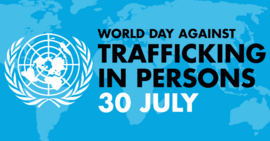World Day Against Trafficking in Persons–OVC is the largest federal funder of services for human trafficking victims in the Nation. During Fiscal Year 2023, OVC human trafficking grantees reported supporting nearly 11,000 individuals who sought services for the first time from their programs.
Source: U.S. Department of Justice
Office for Victims of Crime (OVC) Efforts
OVC works to enhance the Nation’s capacity to assist crime victims and to provide leadership in changing attitudes, policies, and practices in ways that will promote justice and healing for all victims.
In this capacity, OVC strives to uphold the intent of the Trafficking Victims Protection Act of 2000 and its subsequent reauthorizations to ensure that all trafficking victims—regardless of immigration status, gender, age, race/ethnicity, or form of trafficking—receive support in accessing the services they need.
OVC manages the largest amount of funding across the Federal Government dedicated to addressing the needs of survivors of labor and sex trafficking. OVC strengthens the victim service response to human trafficking through grant funding, training and technical assistance, and leadership in the field.

Grants & Funding
OVC funding supports efforts to develop, expand, and strengthen programs for survivors of human trafficking. Visit the Human Trafficking: Grants & Funding page to learn more and to locate funding opportunities for anti-trafficking professionals.
Training & Technical Assistance
OVC offers training and technical assistance to its grantees and to anti-trafficking professionals in the field. Learn more training opportunities and access anti-trafficking resources on our Human Trafficking: Training page.
OVC Leadership in the Field
The OVC Human Trafficking Division leads the Nation in supporting victim-centered and trauma-informed programs, policies, and resources that promote justice, access, and empowerment to enhance capacity to identify, assist, and provide services to all victims of human trafficking, as defined by 22 U.S.C. § 7102(11). OVC has managed anti-trafficking awards for over 20 years and our approach is continuously evolving to better respond to the needs of survivors and communities and to reflect emerging data, research, and trends.
Examples of issues on which OVC is taking a leadership role include, but are not limited to, the development of standards of care, serving survivors of labor trafficking, and engaging meaningfully with individuals with lived experience.
Standards of Care
Recognizing survivors of human trafficking have diverse needs and may receive assistance from a wide array of organizations that have varying degrees of experience and expertise, OVC is partnering with the U.S. Department of Health and Human Services’ Office on Trafficking in Persons (OTIP) to develop of standards of care (SOC) for anti-trafficking service providers in order to promote uniform service standards that will ensure consistent quality of care and reduce potential harm to trafficking survivors.
The SOC will address all levels of victim service responses to adult and minor survivors of sex and labor trafficking rendered by service delivery organizations funded by OVC and OTIP, and other service providers who do not receive that funding. Learn more about the work to develop the standards, opportunities for public comment, and foundational documents.
Labor Trafficking
While our Nation has made tremendous strides in understanding and responding to sex trafficking, labor trafficking in the United States is still an issue that is too often overlooked. In analyzing performance data from its own grantees, OVC identified the need to do more to address this important issue.
In FY 2019, OVC began providing specialized training and technical assistance to grantees to strengthen responses to labor trafficking. Then, in FY 2022, OVC added language to their anti-trafficking funding opportunities giving special consideration to applicants who demonstrated that they were serving survivors of labor trafficking in their community or were committed to expanding their capacity to do so.
Access our Labor Trafficking in the U.S. article for information specific to OVC’s anti-labor trafficking efforts.
Engaging Individuals with Lived Experience
OVC has long understood the importance of seeking out and elevating survivor perspectives in our federal anti-trafficking work, from convening forums and listening sessions to engaging with a wide variety of stakeholders with lived experience, including those appointed to the U.S. Advisory Council on Human Trafficking.
Understanding the importance of meaningful engagement with individuals with lived experience, in FY 2022, OVC funded the Survivor Engagement Training and Technical Assistance Project (SETTA) to assist OVC grantees in meaningful engagement with survivors. The survivor-led team is working to support OVC anti-trafficking grantees and their partners in intentional and sustainable engagement with survivors to improve anti-trafficking programming.
Learn more about SETTA by watching a recorded webinar on cross-cutting training and technical opportunities for grantees and the 2024 National Crime Victims’ Rights Week theme video.
Learn about OVC efforts to ensure that all victims of human trafficking have access to services.






